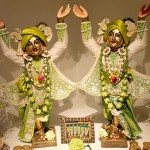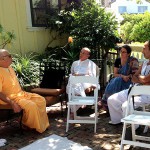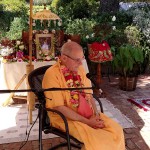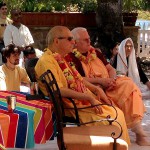Srimad Bhagavatam 4.18.23 to 26 by His Holiness Prahladananda Swami, 6 July, 2012, Slovenia from Lilasuka Das on Vimeo.
SB 04.18.23-26 Rock Music In Hell 2012-07-06
Websites from the ISKCON Universe
 Dallas Morning News,
Dallas Morning News,Each week we will post a question to a panel of about two dozen clergy, laity and theologians, all of whom are based in Texas or are from Texas. They will chime in with their responses to the question of the week. And you, readers, will be able to respond to their answers through the comment box.
Last week’s week’s filibuster in the Texas Senate stopped an abortion bill and catapulted Sen. Wendy Davis to national political attention. Television stories beamed pictures of hundreds of cheering, jeering protesters who shut down Senate business while Republican leaders struggled to regain control. In the end, the bill that would ban abortions after 20 weeks of pregnancy failed and Gov. Rick Perry called the Legislature back into another special session on Monday.
The protesters – criticized as a mob by some and hailed as heroes by others – were very much a part of the story, if only because it’s rare democratic institutions in this country are brought to a halt by people chanting from the balcony in a legislative chamber. The episode has been the focus of heated debate in terms of politics and ideology. Set aside which side you’re on. What if the roles were reversed. When is it ethical and moral to shut down a institution of government?
The question: Was it moral to shut down the Senate? Not whether it was politically successful or tactically expedient or even whether your side prevailed or not, but was it moral?
NITYANANDA CHANDRA DAS, minister of ISKCON (International Society for Krishna Consciousness), Dallas
First of all, it needs to be pointed out that morality is a metaphysical concept. Morality cannot be established by science.
On the relative platform there was no moral issue with citizens using deceptive means when they are ruled by a deceptive government. It would not be the same if modern government were led by those who are not self interested.
On the absolute platform there would be a moral issue of disturbing government processes. Provided that government actually worked for the metaphysical rights of all of living beings without prejudice. Whether they are Black, White, animal, or even in the fetus stage. But that is not the case.
The metaphysical notion of morality can only be fully established when one understands the metaphysical. As long as one cannot see the soul there will be victims. Because of seeing African Americans as soulless beings we had slavery. Because seeing women as half souled beings we have exploitation. Because of seeing animals as soulless beings we have billions unnecessarily painfully slaughtered. And because of seeing the helpless unborn children as soulless beings their own mothers are being endorsed for murder.
To see all responses of the TEXAS Faith panel click here.
 Dallas Morning News,
Dallas Morning News,Each week we will post a question to a panel of about two dozen clergy, laity and theologians, all of whom are based in Texas or are from Texas. They will chime in with their responses to the question of the week. And you, readers, will be able to respond to their answers through the comment box.
Last week’s week’s filibuster in the Texas Senate stopped an abortion bill and catapulted Sen. Wendy Davis to national political attention. Television stories beamed pictures of hundreds of cheering, jeering protesters who shut down Senate business while Republican leaders struggled to regain control. In the end, the bill that would ban abortions after 20 weeks of pregnancy failed and Gov. Rick Perry called the Legislature back into another special session on Monday.
The protesters – criticized as a mob by some and hailed as heroes by others – were very much a part of the story, if only because it’s rare democratic institutions in this country are brought to a halt by people chanting from the balcony in a legislative chamber. The episode has been the focus of heated debate in terms of politics and ideology. Set aside which side you’re on. What if the roles were reversed. When is it ethical and moral to shut down a institution of government?
The question: Was it moral to shut down the Senate? Not whether it was politically successful or tactically expedient or even whether your side prevailed or not, but was it moral?
NITYANANDA CHANDRA DAS, minister of ISKCON (International Society for Krishna Consciousness), Dallas
First of all, it needs to be pointed out that morality is a metaphysical concept. Morality cannot be established by science.
On the relative platform there was no moral issue with citizens using deceptive means when they are ruled by a deceptive government. It would not be the same if modern government were led by those who are not self interested.
On the absolute platform there would be a moral issue of disturbing government processes. Provided that government actually worked for the metaphysical rights of all of living beings without prejudice. Whether they are Black, White, animal, or even in the fetus stage. But that is not the case.
The metaphysical notion of morality can only be fully established when one understands the metaphysical. As long as one cannot see the soul there will be victims. Because of seeing African Americans as soulless beings we had slavery. Because seeing women as half souled beings we have exploitation. Because of seeing animals as soulless beings we have billions unnecessarily painfully slaughtered. And because of seeing the helpless unborn children as soulless beings their own mothers are being endorsed for murder.
To see all responses of the TEXAS Faith panel click here.


Although I am from England and grew up as a Christian, I was always interested in Vishnu. When I became a Vaishnava I learned more about Vishnu from the scriptures. I have also raised my children on the same path. Here is a dramatic dance by my daughters Jahnavi and Tulasi, with Jaya Krishna Das. It describes the avatars of Lord Vishnu according to the early mediaeval song written by Jayadeva Goswami. You will hear me singing the song in the background.
One of the continuing questions I am asked is simple in form but poses the most difficult in answering as there is firstly a need to understand why the conclusion is met. It is a question I’ve been asked by both initiated and uninitiated devotees and although the wording is slightly different the thrust of it remains the same: I have faith in the chanting of the holy names of Krishna, I have faith in the Guru’s; But and for some it’s a Big But I don’t have faith in ISKCON Management.
Indeed sometimes I have empathy for what follows; sometimes it’s a clash of personalities or a long standing issue with people in authority (the guru’s visit is usually very brief and so some detachment is their). Other times it’s more deeper than this and in one way or another feel miss treated or that their appears to be a mismatch between the philosophy and it’s practice.
Personally I see how this can become a huge stumbling block, when we see that we teach honesty and then when faced with being asked to be dishonest in the legal system even when there is written and e-mail evidence not even a reprimand is given; OK so dishonesty is expected in this age of kali and we could ourselves apply a little logic and continue in service little disturbed. We can cheat and hub-wink management by skilful words but ultimately we are answerable to Krishna and if we cheat and become dishonest then we can cheat individuals even management but not Krishna.
But when injustice is done or if there is a perceived injustice the mind takes over, the logic boards switch off and like a cancer as word spreads from one to another so resentment grows and at the extreme ridicule and a withdrawal of association (either temporary or permanent).
This however is not unusual we are in the age of quarrel and after all it’s easy to manage without being in the position of management whilst it’s harder to manage when actually in that position of management; we can if our words are to be believed much better at the job than those doing it up to the point where were appointed to the post.
So am I surprised that this is a continuing and ongoing question?
Well NO.
My answer remains the same, continue to chant and follow the regulative principles and absorb oneself in service and leave the management politics to the management; after all ultimately we are answerable to Krishna not for others actions but our own.
It’s a point I have to constantly remind my mind of but out of interest and to explore more fully what are your thoughts on this question?
And here is an interesting quote to ponder closely:
If your preaching work is strong, then your management of temple affairs will also become automatically very strong. Just like if the head wills it, the hand will move. Preaching is like the head of our Krishna consciousness Society – if the head is removed, the whole body dies. Managing is the hands, which work nicely if the head is healthy. If the hands are removed, the body will not die, but it will be crippled. So preaching is more important than management, but both must be there if the whole body is to operate nicely.
- Srila Prabhupada
I have been working on this character lately who thinks a lot about life. Eventually, they make their way onto a T-shirt which you can buy ; ) Click the image and it will take you to the rest of the collection. Simple efforts from me and hope you will like it.
http://www.redbubble.com/people/ponderji
2013 06 27 Srimad Bhagavatam 10 21 16 Inherent Quality of Krishna is his all Attractiveness
BY GOLOKA CANDRA DASA
KUALA LUMPUR - Clueless people often ask the question: "Does God exist?". Count befuddled scientists too in this category. On the other hand, smart people ask the smart question: "Does God play chess?"
The second question already accepts by implication the existence of God (or Supreme Intelligence, as Albert Einstein would put it). The questioner, especially if he happens to be working in the field of artificial intelligence, is more interested to learn about the thinking processes that a supremely intelligent being would utilise to solve the complex situations arising on the chessboard that are generally beyond the calculation of ordinary mortals. The objective of the questioner is to harness the same thinking processes to solve other problems in the real world.
Ever since the birth of computers, chess has been used as a yardstick to measure progress in artificial intelligence. One indicator of such progress is the regular "Man versus Machine" matches. In the beginning of the computing age (the good old days), human champions used to trash the machines. Today computers would trash 99.99% of the human race and hold the edge against even the best human players.
It has long been the Holy Grail for researchers and computer programmers in the realm of artificial intelligence to write a program that would enable a computer to play chess perfectly, without error or inaccuracy. As perfectly as God would, should He be so inclined to play the game.
Thankfully for chess enthusiasts, modern science is way behind in its quest to fully understand the game and crack the chess riddle once and for all, and thus render the game obsolette. In fact, I doubt that we would ever see the day when computers would be able to play chess perfectly, even if the best of their breed are quite impossible to be beaten by any human player today.
Now returning to the original question as to whether God plays chess, the affirmative answer is found in the Vedic scriptures. In the Mahabharata and the Shrimad Bhagavatam, there are references attesting to the chess-playing pastimes of the Supreme Lord Sri Krishna with His royal consorts in Dvaraka.
Even during His childhood frolics with the cowherd boys and girls in the forests of Vrindavana, the Lord is fond of playing chess. His Divine Grace AC Bhaktivedanta Swami Srila Prabhupada, founder-acharya of the International Society for Krishna Consciousness, writes thus in the "Nectar of Devotion" Chapter 42:
"...Krishna played with His intimate friends sometimes by fighting or wrestling with their arms, sometimes by playing ball and sometimes by playing chess."
So yes, God (addressed as Sri Krishna in the Sanskrit texts) does play chess. But if anybody out there is harbouring any delusions of challenging God to a match, be forewarned though that He is very selective about who He chooses to play with.
First you have to make a lot of spiritual advancement to qualify yourself to see God, before you can even think of playing with Him. According to the Vedic scriptures, only a spiritually elevated person will be able to see God face-to-face (let alone play chess with Him).
Amazing as it may seem, there were some exceptional mortals, even in comparatively recent history, whom God actually chose to play chess with. As the following history reveals.
Mathematicians and scientists love to quote this story (in some form or other) to explain mathematical concepts related herein, for example, exponential progression and binary numbers. Even the downright atheistic and those with little faith in God, love to quote this fascinating chess-playing pastime of God in order to explain mathematical ideas. You too will be similarly fascinated after you read our narration below.
In a small town called Ambalappuzha in Alappuzha district of Kerala state in South India, there is a famous ancient temple of the Supreme Lord Sri Krishna. This temple is believed to have been built more than a thousand years ago by a local king named Chembakasserry Pooradam Thirunal-Devanarayanan Thampuran.
This temple has a historic link with the renowned Guruvayur temple. When Tipu Sultan plundered the region in 1789, the Sri Krishna deity (Sri Guruvayurappan) from Guruvayur was safely brought to the Ambalappuzha temple and sheltered there in a special shrine that is now called Guruvayur Ambalam.
The temple attracts many visitors and tourists and its popularity is attributed to the nectarean quality of the paal payasam served there daily to all pilgrims. It is said that even Sri Guruvayurappan daily visits this temple (where He once resided) just to relish the paal payasam.
Paal payasam is a rich desert made of milk, rice and jaggery and is generally served during special occasions and festivals only. In particular, on the solar New Year day in mid-April when the Sun completes a full revolution and returns to the first sign of Mesha (Aries) on the sidereal zodiac. This solar New Year Day is celebrated throughout India and the surrounding countries in some form or other, in accordance with local customs. In Kerala state, it is called Vishu and paal payasam is prepared in all households for this special occasion.
However the daily tradition of serving paal payasam has been going at the Ambalappuzha temple for centuries as a direct result of a chess-playing pastime of the temple's presiding deity, Lord Sri Krishna. The game of chess was then known as chaturanga, the ancient and more complex version compared to the modern game.
Sri Krishna desired that paal payasam be served to the pilgrims at the Ambalappuzha temple DAILY, and not just on major festival days. But who would sponsor such an undertaking?
As is generally the case, the temple administration is under the jurisdiction of the local king, who also happened to be a great devotee of the Lord as well as a champion chess player. So the Lord assumed the form of a brahmana sage and appeared before the king in his royal court, and challenged him to a chess match.
Since chess is a military-themed strategy game, it was generally played by the kings and kshatriyas (military class) of the time. They would also play for high stakes. When the king inquired what the stake would be, the brahmana answered: "Rice grains", and stipulated that the number should correspond to the squares of the chessboard -- one grain for the first square, two grains for the second square, four grains for the third square and so forth, each square doubling up on the previous, until all the squares on the chessboard are covered.
The king was puzzled by the brahmana's strange request which seemed paltry to him. But as a king, he was bound by the kshatriya (military) code of honour to accept a challenge to combat or competition. So he agreed to the brahmana's proposal.
The chess match started. The king, though a very experienced and competent player, was inevitably outplayed by the divine sage who won the match. The magnanimous king offered to gift gold and other valuables to the brahmana for his victory. But the brahmana stuck to his guns and insisted that the king pay him just the rice grains that they had played for.
The king called for a sack of rice. His servants started piling the rice grains according to the stipulated formula corresponding to the squares on the chessboard: 1, 2, 4, 8, 16, 32, 64, 128, 256, 512, 1024 grains...
Immediately the king realised what the divine sage had known all along, that the numbers would explode exponentially to impossible magnitudes soon. By the 20th square, the number of grains would exceed one million. By the 40th square, the number would exceed a trillion.
The king realised that this rate of progression would soon empty all his royal granaries. Nay, even all the rice in the world would not be sufficient to fulfill his debt to the brahmana.
To give an idea of the astronomical size of the numbers generated by the pre-agreed rules of this chess match, the total number of rice grains that would correspond to a 64-squared (8 x 8) chessboard is 2 ^ 64 - 1 which is exactly 18446744073709551615.
In approximate terms, this is about 10 ^ 18 * 18, or 18 billion billion rice grains. It is estimated that this number would cover the land surface area of modern India seven feet high in rice grains.
The king, as the chief enforcer of the laws of the land, knew well the penalty generally imposed on a person who defaults on his debt -- that he would lose all his material possessions to his creditor. Now he was honour-bound to adhere to the same principle that he enforced.
Although the honourable king was prepared to accept the imminent loss of his wealth and kingdom, still he was feeling very wretched and helpless over being unable to keep his plighted word to the brahmana. The king gazed at the divine personality before him and wondered who is this extraordinary person who had outplayed him and what is his purpose.
Lord Krishna, seeing the king in his predicament, revealed His true form to His dear devotee and gave him a reprieve -- that he need not pay his debt on the spot, but that it can be paid by daily instalments.
Lord Krishna ordered that the king and his descendants should prepare and serve paal payasam (sweet rice cooked with milk and jaggery) at the Ambalappuzha temple every day until such time that the rice grain debt is repaid fully (in the form of paal payasam).
So this in short is the fascinating history of the Ambalappuzha temple and how its long-established tradition of offering paal payasam daily to the presiding deity and then distributing it as prashadam (food sanctified by offering to the Lord) to the pilgrims originated from a historic chess match between Lord Krishna and the king.
 Can’t wait for Festival of India (Ratha-Yatra) on July 13-14th? No problem! Come and join us for the Festival of India launch party on Yonge-Dundas Square. The pre-festival is held on July 6th 2013, one week before the Festival of India itself.
Can’t wait for Festival of India (Ratha-Yatra) on July 13-14th? No problem! Come and join us for the Festival of India launch party on Yonge-Dundas Square. The pre-festival is held on July 6th 2013, one week before the Festival of India itself. Can’t wait for Festival of India (Ratha-Yatra) on July 13-14th? No problem! Come and join us for the Festival of India launch party on Yonge-Dundas Square. The pre-festival is held on July 6th 2013, one week before the Festival of India itself.
Can’t wait for Festival of India (Ratha-Yatra) on July 13-14th? No problem! Come and join us for the Festival of India launch party on Yonge-Dundas Square. The pre-festival is held on July 6th 2013, one week before the Festival of India itself.Here is a summary of the main subject of Chapter 5 of Canto 2.
How the Universe Became the Universe (Vedic Proto-Evolution).
via How the Universe Became the Universe (Vedic Proto-Evolution).
The Vedic view on primordial evolution (as for example expressed in Bhāgavata Purana, 2.5) is that time enters the material energy (which itself is a threefold energy reflecting the original threefold energy of Godhead). When time enters, things can proceed, things can evolve. The force driving the evolution is the svabhāva, which is the psychological disposition of the living entities who wish to project themselves into that material energy. This interaction between svabhāva and the tri-guṇa (threefold material energy) causes the universe to acquire a primordial collective destiny (karma) - which I conceptualize as a “DNA code” for the entire universe.
All this happens, by the way, before creation – while the universe is lying as a “bubble” in the “ocean of causality” aka “ocean of possibility.”
This primordial evolutionary state of the universe is ahaṁkāra - the primeval, collective universal sense that “I will act, I will accomplish my desires.” See, the catalyst of evolution was svabhāva, which is composed of desire. So when it progresses slightly in evolution it becomes the sense that “I can accomplish my desire.”
The three guṇa then interact with that ahaṁkāra and evolution continues by producing three primordial powers: the power to create material (dravya-śakti, created by tamo-guṇa), the power to perceive material (jñāna-śakti, created by sattva-guṇa), and the power to manipulate and interact with material (kriyā-śakti, created by rajo-guṇa).
Each power then evolves along its own line. This evolution is interconnected: Each material that evolves produces a sense object, which requires the evolution of a specific perceptual power, and a specific power of manipulation.
Dravya-śakti (the power to create material) eventually evolves into the primordial template of all perceivable objects. First it evolves into space – which is not just the stuff astronauts walk around in, it literally means space, like, “Hey, give me some space, buddy.” Space is the stuff that everything else fits inside. So the first material element has to be space – a place for everything else to exist within.
The sensual object generated by space is sound.
Some people think this is silly, saying, “There is no sound in space!”
But they are being silly. In space there is no sound that the human ear can percieve. But soundwaves do travel in outerspace, as the transmissions broadcast by our satellites and spacecraft attest to. Space does transmit waves. Sound is a wave.
Waves are differentiated from one another maily by their size – the amount of space they take up. Low pitched sound, for example is a wave that takes lots of space. High pitched sound waves take very little space. Every sound engineer knows that space, not air, produces sound. If you want to improve the sound of your stereo system, or your recording studio you don’t buy an air freshener, you change the space - you adjust the spatial relationship between the sources of sound and your ear.
But air also can transmit sound – and so can fire, water, and earth. One reason is because those elements are vibrated by the waves in space, and our ear interprets those vibrations as sounds. Another reason is that all other elements – air, fire and so on – exist within space and have space within them.
Next to evolve are airs. The vibration of space produces movement. Moving space = wind. When the sky moves, it is wind. Wind introduces the sensation of touch – which is essentially a perception of the friction induced by movement.
Next to evolve are fires, the element that illuminates. Friction causes heat, and heat generates light – that’s how I think of it. Since fire produces light, it introduces the sensation of sight. (note it’s not just “fire” but all radiant, energetic things, like electricity for example)
Next to evolve are waters. Perhaps we can conceptualize this as precipitation caused by heat. Water allows substances to mix, and it is the mixture of substances which produces the sensation we call “taste” (rasa).
Finally, earths evolve. Somehow the water carries elements that it releases as sediments to create solid earth – I conceive of it that way. Earth introduces the sensation of smell. Smell is a type of touch without friction. When particles of a substance physically contact the nose, we smell them. These are usually tiny airborne particles. Nonetheless smell requires particles, which is the essence of the earth element.
One principle of Vedic proto-evolution is that the elements which evolve contain the qualities of the elments they evolved from. So you can hear space, but you can’t feel, see, taste, or smell it. You can hear air and you can feel it too, but you can’t see, taste or smell it. You can hear, feel and see fires and other radiants, but you can’t taste or smell them (you can smell smoke or other charged particles / solids they emit). You can hear, feel, see and taste waters, but you can’t smell it (you can only smell its effect on solids). Earth, the final element, contains all five qualities: you can hear, feel, see, taste, and smell it.
That was the evolutionary path of the dravya-śakti. Alongside this the jñāna-śakti has to evolve substances that can percieve the sensations available from the five objects. So first and foremost it evolves into “mind” – the substance that interprets sensual data. Then it evolves into ten divinities or semi-sentient powers that facilitate the five specific sense perceptions and the five specific ways of manipulating the sense objects. These ten are like the conduits, or “wires” from the mind to the physical sense organs of living beings.
Alongside this, kriyā-śakti has to evolve the actual instruments that will perceive five types of sensual data and transmit them into the jñāna-śakti conduit. So it evolves into the prototypical instruments of hearing, feeling, seeing, tasting, and smelling, as well as the prototypical means of speaking, manipulating, mobilizing, generating, and evacuating.
I think of this whole thing as being essentially the same as a video game! The world of the game exists within the Xbox – it is the dravya-śakti creating all the objects you can see and interact with in the game. Then there is the TV screen – that’s the jñāna-śakti - its the thing that actually shows you the world inside the Xbox computer code. Through it you can percieve the objects available for you to experience and manipulate in the game. Finally, there is the game controller – that’s the kriyā-śakti. It allows you to interact with and manipulate the game world you see on the screen.
The universe, then, is more or less a huge game of ego-based desires.
This evolution takes thousands of thousands of “years.” Finally, when it has come to this point it is ready to become a universe inhabited by living, active beings. Godhead then enters into it, becomes the Supersoul and enters into the Jīvas (individual motes of projected consciousness) lying dormant within it, rousing them to life – granting them the ability to realize the destiny they began to form by their initial svabhāva left over from the previous universe.
Now, if that’s not DAMN COOL, I don’t know WHAT is! ![]()
Originally posted on The Enquirer:
Viz. Śrīmad Bhāgavatam 2.5.22
Time (kāla) is the primary catalyst activating the three qualities (guṇa) by permitting the progress of evolution. The psychological inclinations (svabhāva) of living beings can then stimulate evolutions (pariṇāma) within the three qualities, creating a primordial destiny (karma) for the universe, which can thus evolve into its primeval form (mahāt-tattva).
Viz. Śrīmad Bhāgavatam 2.5.22
Time (kāla) is the primary catalyst activating the three qualities (guṇa) by permitting the progress of evolution. The psychological inclinations (svabhāva) of living beings can then stimulate evolutions (pariṇāma) within the three qualities, creating a primordial destiny (karma) for the universe, which can thus evolve into its primeval form (mahāt-tattva).
This photo from the Ganga showcases what the finished TOVP will look in the natural surroundings of Mayapur. Its size compared to Prabhupada’s samadhi is astounding.
Bhakti Bringa Govinda Swami Maharaj. Friday kirtan. SPb. 14.06.2013
 “As he’d done when we’d walked the streets of New York City, he instructed me how to walk the paths of Raman Reti—how to deal with the monkeys. First, you carry a stick with you. We grew up in kind of tough neighborhoods. He sometimes said that the choice for him of which way to walk home was whether to get beat up by this gang or by that gang. So, he knew how to deal with the streets and taught me that. And the way to deal with the monkeys was to just glance at them once to let them know that you know that they are there. Then you go on your way. So, he had a walking stick with a few designs on it that was a little smaller on the bottom than the top. One morning, there were some Vraja-vasi boys playing with a small ball, and we grew up playing stickball, so he reversed his cane and had the boys throw the ball to him like he was lining up at the plate, playing stickball in the dust of Vrindavan. It made a powerful connection for me.” — Kalachandji das
“As he’d done when we’d walked the streets of New York City, he instructed me how to walk the paths of Raman Reti—how to deal with the monkeys. First, you carry a stick with you. We grew up in kind of tough neighborhoods. He sometimes said that the choice for him of which way to walk home was whether to get beat up by this gang or by that gang. So, he knew how to deal with the streets and taught me that. And the way to deal with the monkeys was to just glance at them once to let them know that you know that they are there. Then you go on your way. So, he had a walking stick with a few designs on it that was a little smaller on the bottom than the top. One morning, there were some Vraja-vasi boys playing with a small ball, and we grew up playing stickball, so he reversed his cane and had the boys throw the ball to him like he was lining up at the plate, playing stickball in the dust of Vrindavan. It made a powerful connection for me.” — Kalachandji das
———————————————————————————————————————————–












———————————————————————————————————————————–
Balarama das
Hridayananda das Goswami
Kalachandji das
Indranila Mani dasi
Sraddanjali dasi
Devadahiti dasi
Syamali dasi
Revati dasi
Nagapatni dasi
Sarvatma das
Rama das
Nick Pritchard
Radhapadadhuli dasi
Rtadhvaja Swami
Giriraj Swami